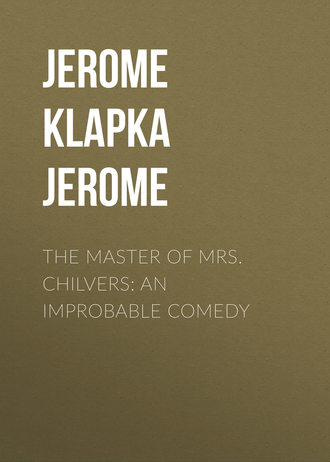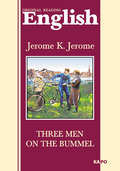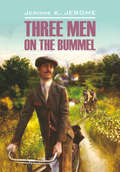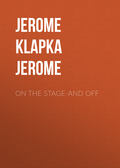
Джером К. Джером
The Master of Mrs. Chilvers: An Improbable Comedy
Mrs. Chinn. (She wipes her hand on her apron before taking Annys’s proffered hand.)
Geoffrey. (To Sigsby.) I can turn up there later in the evening. (He joins the others for a moment – talks with them.)
Mrs. Chinn. (Now shaking hands.) Quite well, thank you, ma’am. (She has cast a keen, motherly glance at Annys.) I hope you’re taking care of yourself, ma’am.
Annys. Of course I am. We Politicians owe it to our Party. (Laughs.) How are they getting on here, without me?
Mrs. Chinn. Well, ma’am, from what I can see, I think Mr. Chilvers is trusting a little too much to his merits. Shall I bring some more cups and saucers, sir?
Geoffrey. Ah! yes! (To Annys.) You’ll have some tea?
Annys. Strong, please, Mrs. Chinn.
(Mrs. Chinn goes out.)
(Laughs.) Yes, I know it’s bad for me. (She puts a hand over his mouth.)
Phoebe. Old Mother Chinn is quite right, you know, Geoff. You’re not putting up a good fight.
Geoffrey. (A slight irritability begins to show itself.) I frankly confess that I am not used to fighting women.
Elizabeth. Yes. It was easier, no doubt, when we took it lying down.
Annys. You promised, if I brought you, that you would be good.
Geoffrey. I wish it had been you.
Phoebe. Yes, but we don’t!
(As she and Elizabeth move away.)
Did you have a row with the doctor when you were born?
(To which Elizabeth replies, though the words reach only Phoebe: “I might have, if I had known that my mother was doing all the work, while he was pocketing the fee!”)
Lamb. You see, Mrs. Chilvers, our difficulty is that there is nothing to be said against you – except one thing.
Annys. What’s that?
Lamb. That you’re a woman.
Annys. (Smiling.) Isn’t that enough?
Sigsby. Quite enough, Mrs. Chilvers, if the guv’nor would only say it.
Annys. (To Geoffrey.) Why don’t you? I’ll promise not to deny it.
(The others drift apart. They group themselves near to the window. They talk together – grow evidently interested and excited.)
Geoffrey. I have just had a letter from your – Election Agent, expressing indignation with one of my supporters for merely having hinted at the fact.
Annys. I don’t understand.
Geoffrey. (He takes from the table the letter and hands it to her in silence. He seats himself on the settee and watches her.)
Annys. (She seats herself on a chair just opposite to him; reads the letter through in silence.) In my case it does not apply.
Geoffrey. How do you know?
Annys. (The atmosphere has grown suddenly oppressive.) Oh, I – I think we might find some other reason than that. (She hands him back the letter.)
Geoffrey. It’s the only one of any importance. It embraces all the others. Shall woman be mother – or politician? (He puts the letter in his pocket.)
Annys. Why cannot she be both?
Geoffrey. (He is looking at her searchingly.) Because if she is the one, she doesn’t want to be the other.
(A silence.)
Annys. You are wrong. It is the mother instinct that makes us politicians. We want to take care of the world.
Geoffrey. Exactly. You think man’s job more interesting than your own.
Annys. (After a moment.) Who told you that it was a man’s job?
Geoffrey. Well. (He shrugs his shoulders.) We can’t do yours.
Annys. Can’t we help each other?
Geoffrey. As, for instance, in this election! (He gives a short laugh.)
Annys. Of course, this is an exceptional case.
Geoffrey. It’s an epitome of the whole question. You are trying to take my job away from me. To the neglect of your own.
Annys. (After another moment’s silence.) Haven’t I always tried to do my duty?
Geoffrey. I have thought so.
Annys. Oh, my dear, we mustn’t quarrel. You will win this election. I want you to win it. Next time we must fight side by side again.
Geoffrey. Don’t you see? Fighting you means fighting the whole movement. (He indicates the posters pinned to the walls.) That sort of thing.
Annys. (After a brief inspection.) Not that way. (Shaking her head.) It would break my heart for you to turn against us. Win because you are the better man. (Smiling.) I want you to be the better man.
Geoffrey. I would rather be your husband.
Annys. (Smiling.) Isn’t that the same thing?
Geoffrey. No. I want a wife.
Annys. What precisely do you mean by “wife”?
Geoffrey. It’s an old-established word.
(Mrs. Chinn has entered to complete the tea arrangements. She is arranging the table.)
Mrs. Chinn. There’s a deputation downstairs, sir, just come for you.
Geoffrey. What are they?
Mrs. Chinn. It’s one of those societies for the reform of something. They said you were expecting them.
Sigsby. (Breaking away from the group by the window.) Quite right. (Looks at his watch.) Five o’clock, I’ll bring them up.
Geoffrey. Happen to know what it is they want to reform?
Sigsby. (By door.) Laws relating to the physical relationship between the sexes, I think.
Geoffrey. Oh, only that!
Sigsby. Something of the sort.
(He goes out. Mrs. Chinn also by the other door.)
Geoffrey. (Rising.) Will you pour out?
Annys. (She has been thinking. She comes back to the present.) We shan’t be in your way?
Geoffrey. Oh, no. It will make it easier to get rid of them.
(Annys changes her chair. The others gather round. The service and drinking of tea proceeds in the usual course.)
(To Elizabeth.) You’ll take some tea?
Elizabeth. Thank you.
Geoffrey. You must be enjoying yourself just now.
Elizabeth. (Makes a moue.) They insist on my being agreeable.
Annys. It’s so good for her. Teaches her self-control.
Lamb. I gather from Mrs. Spender, that in the perfect world there will be no men at all.
Elizabeth. Oh, yes, they will be there. But in their proper place.
St. Herbert. That’s why you didn’t notice them.
(The Deputation reaches the door. The sound of voices is heard.)
Phoebe. She’s getting on very well. If she isn’t careful, she’ll end up by being a flirt.
(The Deputation enters, guided by Sigsby. Its number is five, two men and three women. Eventually they group themselves – some standing, some sitting – each side of Geoffrey. The others gather round Annys, who keeps her seat at the opposite side of the table.)
Sigsby. (Talking as he enters.) Exactly what I’ve always maintained.
Hopper. It would make the husband quite an interesting person.
Sigsby. (Cheerfully.) That’s the idea. Here we are, guv’nor. This is Mr. Chilvers.
(Geoffrey bows, the Deputation also. Sigsby introduces a remarkably boyish-looking man, dressed in knickerbockers.)
Sigsby. This is Mr. Peekin, who has kindly consented to act as spokesman. (To the Deputation, generally.) Will you have some tea?
Miss Borlasse. (A thick-set, masculine-featured lady, with short hair and heavy eyebrows. Her deep, decisive tone settles the question.) Thank you. We have so little time.
Mr. Peekin. We propose, Mr. Chilvers, to come to the point at once. (He is all smiles, caressing gestures.)
Geoffrey. Excellent.
Peekin. If I left a baby at your door, what would you do with it?
Geoffrey. (For a moment he is taken aback, recovers himself.) Are you thinking of doing so?
Peekin. It’s not impossible.
Geoffrey. Well, it sounds perhaps inhospitable, but do you know I really think I should ask you to take it away again.
Peekin. Yes, but by the time you find it there, I shall have disappeared – skedaddled.
Hopper. Good. (He rubs his hands. Smiles at the others.)
Geoffrey. In that case I warn you that I shall hand it over to the police.
Peekin. (He turns to the others.) I don’t myself see what else Mr. Chilvers could be expected to do.
Miss Borlasse. He’d be a fool not to.
Geoffrey. Thank you. So far we seem to be in agreement. And now may I ask to what all this is leading?
Peekin. (He changes from the debonnair to the dramatic.) How many men, Mr. Chilvers, leave their babies every year at the door of poverty-stricken women? What are they expected to do with them?
(A moment. The Deputation murmur approval.)
Geoffrey. I see. But is there no difference between the two doors? I am not an accomplice.
Peekin. An accomplice! Is the ignorant servant-girl – first lured into the public-house, cajoled, tricked, deceived by false promises – the half-starved shop-girl in the hands of the practised libertine – is she an accomplice?
Mrs. Peekin. (A dowdily-dressed, untidy woman, but the face is sweet and tender.) Ah, Mr. Chilvers, if you could only hear the stories that I have heard from dying lips.
Geoffrey. Very pitiful, my dear lady. And, alas, only too old. But there are others. It would not be fair to blame always the man.
Annys. (Unnoticed, drawn by the subject, she has risen and come down.) Perhaps not. But the punishment always falls on the woman. Is that quite fair?
Geoffrey. (He is irritated at Annys’s incursion into the discussion.) My dear Annys, that is Nature’s law, not man’s. All man can do is to mitigate it.
Peekin. That is all we ask. The suffering, the shame, must always be the woman’s. Surely that is sufficient.
Geoffrey. What do you propose?
Miss Borlasse. (In her deep, fierce tones.) That all children born out of wedlock should be a charge upon the rates.
Miss Ricketts. (A slight, fair, middle-aged woman, with a nervous hesitating manner.) Of course, only if the mother wishes it.
Geoffrey. (The proposal staggers him. But the next moment it inspires him with mingled anger and amusement.) My dear, good people, have you stopped for one moment to consider what the result of your proposal would be?
Peekin. For one thing, Mr. Chilvers, the adding to the populace of healthy children in place of the stunted and diseased abortions that is all that these poor women, out of their scanty earnings, can afford to present to the State.
Geoffrey. Humph! That incidentally it would undermine the whole institution of marriage, let loose the flood-gates that at present hold immorality in check, doesn’t appear to trouble you. That the law must be altered to press less heavily upon the woman – that the man must be made an equal sharer in the penalty – all that goes without saying. The remedy you propose would be a thousand times worse than the disease.
Annys. And meanwhile? Until you have devised this scheme (there is a note of contempt in her voice) under which escape for the man will be impossible?
Geoffrey. The evil must continue. As other evils have to until the true remedy is found.
Peekin. (He has hurriedly consulted with the others. All have risen – he turns to Geoffrey.) You will not support our demand?
Geoffrey. Support it! Do you mean that you cannot yourselves see that you are holding out an indemnity to every profligate, male and female, throughout the land – that you would be handicapping, in the struggle for existence, every honest man and woman desirous of bringing up their children in honour and in love? Your suggestion is monstrous!
Peekin. (The little man is not without his dignity.) We apologise, Mr. Chilvers, for having taken up your time.
Geoffrey. I am sorry the matter was one offering so little chance of agreement.
Peekin. We will make only one slight further trespass on your kindness. Mrs. Chilvers, if one may judge, would seem to be more in sympathy with our views. Might we – it would be a saving of time and shoe leather (he smiles) – might we take this opportunity of laying our case before her?
Geoffrey. It would be useless.
(A short silence. Annys, with Elizabeth and Phoebe a little behind her, stands right. Lamb, Sigsby, and St. Herbert are behind Geoffrey centre. The Deputation is left.)
Hopper. Do we gather that in this election you speak for both candidates?
Geoffrey. In matters of common decency, yes. My wife does not associate herself with movements for the encouragement of vice.
(There is another moment’s silence.)
Annys. But, Geoffrey, dear – we should not be encouraging the evil. We should still seek to find the man, to punish him. The woman would still suffer —
Geoffrey. My dear Annys, this is neither the time nor place for you and me to argue out the matter. I must ask you to trust to my judgment.
Annys. I can understand your refusing, but why do you object to my —
Geoffrey. Because I do not choose for my wife’s name to be linked with a movement that I regard as criminal. I forbid it.
(It was the moment that was bound to come. The man’s instincts, training, have involuntarily asserted themselves. Shall the woman yield? If so, then down goes the whole movement – her claim to freedom of judgment, of action, in all things. All watch the struggle with breathless interest.)
Annys. (She speaks very slowly, very quietly, but with a new note in her voice.) I am sorry, but I have given much thought to this matter, and – I do not agree with you.
Mrs. Peekin. You will help us?
Annys. I will do what I can.
Peekin. (He takes from his pocket a folded paper.) It is always so much more satisfactory when these things are in writing. Candidates, with the best intentions in the world, are apt to forget. (He has spread the paper on a corner of the table. He has in his hand his fountain-pen.)
Annys. (With a smile.) I am not likely to forget, but if you wish it – (She approaches the table.)
Geoffrey. (He interposes. His voice is very low, almost a whisper.) My wife will not sign.
Annys. (She also speaks low, but there is no yielding in her voice.) I am not only your wife. I have a duty also to others.
Geoffrey. It is for you to choose. (He leaves the way open to her.)
(The silence can almost be felt. She moves to the table, takes up the paper. It contains but a few lines of writing. Having read it, she holds out her hand for the pen. Peekin puts it in her hand. With a firm hand she signs, folds the paper, and returns it to him. She remains standing by the table. With the removal of the tension there comes a rustle, a breaking of the silence.)
Miss Ricketts. (She seizes Annys’s hand, hanging listlessly by her side, and, stooping, kisses it.)
Miss Borlasse. That is all, isn’t it?
Peekin. We thank you, Mrs. Chilvers. Good afternoon.
Annys. (The natural reaction is asserting itself. She pulls herself together sufficiently to murmur her answer.) Good afternoon.
Mrs. Peekin. (The Deputation is moving away; she takes from her waist a small bunch of flowers, and, turning, places them in Annys’s hand.)
Annys. (She smiles, remains standing silent, the flowers in her hand.)
(“Good afternoons” are exchanged with some of the others. Finally:)
Peekin. Good afternoon, Mr. Chilvers.
Geoffrey. (Who has moved away.) Good afternoon.
(The Deputation joins Sigsby by the door. He leads them out.)
Elizabeth. (To Phoebe.) Are you going my way?
Phoebe. (She glances round at Annys.) Yes, I’ll come with you.
St. Herbert. I will put you into a bus, if you will let me. We don’t sport many cabs in East Poplar. (He is helping Elizabeth with her cloak.)
Elizabeth. Thank you.
Lamb. I’ve got to go up West. (To Geoffrey.) Will you be at the House this evening?
Geoffrey. (He is standing by the desk pretending to look at some papers.) I shall look in about ten o’clock.
Lamb. One or two things I want to say to you. Goodbye for the present.
Geoffrey. Goodbye!
Phoebe. Goodbye, old man. (She stretches out her hand.)
Geoffrey. Goodbye. (She shakes hands with a smile, exchanges a casual “goodbye” with Elizabeth.)
(They go towards the door.)
(Sigsby re-enters.)
Sigsby. (To Lamb.) Are you going?
Lamb. Yes. I’ll see you to-morrow morning. About ten o’clock.
Sigsby. I shall be here. (He exchanges a “good afternoon” with the others.)
(They go out. Sigsby crosses and goes into the other room.)
Annys. (She has let fall the flowers on the table. She crosses to where Geoffrey still stands by the desk, his back towards her. She stretches out her hand, touches him. He does not move.) Geoffrey!
(But still he takes no notice.)
I am so sorry. We must talk it over quietly – at home.
Geoffrey. (He turns.) Home! I have no home. I have neither children nor wife. I keep a political opponent.
(Annys starts back with a cry. He crosses in front of her and seats himself at the table. The flowers are lying there; he throws them into the waste-paper basket.)
Annys. (She puts on her cloak, moves towards the door. Half-way she pauses, makes a movement towards him. But he will not see. Then a hard look comes into her eyes, and without another word she goes out, leaving the door open.)
(Sigsby is heard moving in the other room.)
Geoffrey. (He is writing.) Sigsby.
Sigsby. Hallo!
Geoffrey. That poster I told young Gordon I wouldn’t sanction, “The Woman spouting politics, the Man returning to a slattern’s home.”
(Sigsby enters.)
Sigsby. I have countermanded them.
Geoffrey. Countermand them again. We shall want a thousand.
Sigsby. (Can hardly believe his ears.)
Geoffrey. (With a gesture round the room.) All of them. “A Man for Men!” “Save the Children!” “Guard your Homes!” All the damned collection. Order as many as you want.
Sigsby. (His excitement rising.) I can go ahead. You mean it?
Geoffrey. (He looks at him.) It’s got to be a fight! (A moment. He returns to his writing.) Telephone Hake that I shall be dining at the Reform Club.






